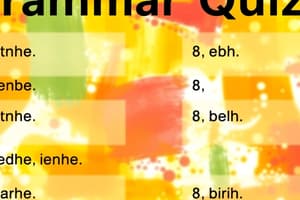Podcast
Questions and Answers
Aşağıdakilerden hangisi Future Perfect Continuous (Gelecek Tam Süreklilik) zamanını ifade eder?
Aşağıdakilerden hangisi Future Perfect Continuous (Gelecek Tam Süreklilik) zamanını ifade eder?
- I will play tennis next week.
- They are swimming in the pool.
- By next Christmas, I will have been working for three years. (correct)
- He has been playing football for two hours.
Aşağıdakilerden hangisi modal fiillerin kullanımına bir örnek değildir?
Aşağıdakilerden hangisi modal fiillerin kullanımına bir örnek değildir?
- She will arrive tomorrow.
- You can go to the party.
- I drink coffee every morning. (correct)
- They should study for the exam.
Aşağıda verilen cümlelerden hangisi ikinci koşul cümlesine (Second Conditional) örnek teşkil eder?
Aşağıda verilen cümlelerden hangisi ikinci koşul cümlesine (Second Conditional) örnek teşkil eder?
- If it rains, the ground gets wet.
- If you study, you will pass the test.
- If I am late, I will call you.
- If I had wings, I would fly. (correct)
Aşağıdaki cümlelerin hangisi pasif ses (Passive Voice) yapısını doğru bir şekilde kullanır?
Aşağıdaki cümlelerin hangisi pasif ses (Passive Voice) yapısını doğru bir şekilde kullanır?
Aşağıdakilerden hangisi düzensiz fiillerden birinin doğru geçmiş zaman formunu belirtir?
Aşağıdakilerden hangisi düzensiz fiillerden birinin doğru geçmiş zaman formunu belirtir?
Aşağıdakilerden hangisi, şu anda devam eden bir eylemi ifade etmek için kullanılan zaman kipidir?
Aşağıdakilerden hangisi, şu anda devam eden bir eylemi ifade etmek için kullanılan zaman kipidir?
Aşağıdaki cümlelerden hangisi Geçmiş Zaman kullanılarak doğru bir şekilde oluşturulmuştur?
Aşağıdaki cümlelerden hangisi Geçmiş Zaman kullanılarak doğru bir şekilde oluşturulmuştur?
Aşağıdaki cümlelerden hangisi Gelecek Zamanı ifade eder?
Aşağıdaki cümlelerden hangisi Gelecek Zamanı ifade eder?
Hangi cümle, Geçmiş Perfect Continuous Zamanı kullanarak bir olayı ifade etmektedir?
Hangi cümle, Geçmiş Perfect Continuous Zamanı kullanarak bir olayı ifade etmektedir?
Aşağıdakilerden hangisi Present Perfect Zamanın doğru bir örneğidir?
Aşağıdakilerden hangisi Present Perfect Zamanın doğru bir örneğidir?
Aşağıdaki eylemlerden hangisi Simple Present Zamanı ifade eder?
Aşağıdaki eylemlerden hangisi Simple Present Zamanı ifade eder?
Aşağıdakilerden hangisi Future Perfect Zamanına uygun bir örnektir?
Aşağıdakilerden hangisi Future Perfect Zamanına uygun bir örnektir?
Aşağıdakilerden hangisi Present Continuous Zamanının kullanıldığı bir cümledir?
Aşağıdakilerden hangisi Present Continuous Zamanının kullanıldığı bir cümledir?
Flashcards
Gelecek Zaman Devamlı
Gelecek Zaman Devamlı
Gelecekte belli bir zaman noktasından önce devam eden eylemler için kullanılır. Örnek: Gelecek yılın Noel'ine kadar beş yıl çalışıyor olacağım.
Modal Fiiller
Modal Fiiller
Olabilirlik, zorunluluk, izin veya tavsiye gibi kavramları ifade etmek için diğer zamanlarla birlikte kullanılır.
Zaman Uyumlu
Zaman Uyumlu
Cümle ve paragraf içinde tutarlı zaman kullanımı.
Düzensiz Fiiller
Düzensiz Fiiller
Signup and view all the flashcards
Koşullu Cümleler
Koşullu Cümleler
Signup and view all the flashcards
Şimdiki Zaman
Şimdiki Zaman
Signup and view all the flashcards
Basit Şimdiki Zaman
Basit Şimdiki Zaman
Signup and view all the flashcards
Şimdiki Sürekli Zaman
Şimdiki Sürekli Zaman
Signup and view all the flashcards
Şimdiki Mükemmel Zaman
Şimdiki Mükemmel Zaman
Signup and view all the flashcards
Şimdiki Mükemmel Sürekli Zaman
Şimdiki Mükemmel Sürekli Zaman
Signup and view all the flashcards
Geçmiş Zaman
Geçmiş Zaman
Signup and view all the flashcards
Basit Geçmiş Zaman
Basit Geçmiş Zaman
Signup and view all the flashcards
Geçmiş Sürekli Zaman
Geçmiş Sürekli Zaman
Signup and view all the flashcards
Study Notes
Introduction to Tenses
- English grammar uses tenses to indicate the time of an action or state of being.
- Tenses show when the action happened, is happening, or will happen.
- Different tenses are used for different situations, creating clarity and precision in expressing time.
Present Tense
- Expresses actions happening now, habits, general truths, or future arrangements.
- Simple Present: Used for habitual actions, general truths, or unchanging situations.
- Example: I walk to school every day. The sun rises in the east.
- Present Continuous: Used for actions happening now, temporary situations, or future arrangements scheduled.
- Example: I am studying English now. She is going to the store later.
- Present Perfect: Used for actions completed in an unspecified time before now, or actions with results continuing into the present.
- Example: I have finished my homework. She has lived in New York for ten years.
- Present Perfect Continuous: Used for actions continuing or repeating from the past up to the present.
- Example: I have been studying English all morning.
Past Tense
- Shows actions or states of being that occurred in the past.
- Simple Past: Expresses completed actions at a specific time in the past.
- Example: I went to the park yesterday. They played soccer.
- Past Continuous: Describes actions happening in progress at a particular time in the past.
- Example: She was reading a book when I called. They were playing basketball when it started to rain.
- Past Perfect: Used to describe an action that was completed before another action in the past.
- Example: I had finished my work before I went to the party. She had already eaten when they arrived.
- Past Perfect Continuous: Shows that the action was already in progress before another action in the past.
- Example: I had been studying for hours before I passed the test.
Future Tense
- Shows actions or states of being that will occur in the future.
- Simple Future: Used for actions expected to happen in the future. Shows intention or plans.
- Example: I will go to the movies tomorrow. They will be happy to hear the news.
- Future Continuous: Shows an action in progress at a specific time in the future.
- Example: I will be studying at 7 pm. They will be playing games.
- Future Perfect: For actions that will be completed before a certain point in the future.
- Example: By next year, I will have finished college. She will have worked for ten years.
- Future Perfect Continuous: For actions that will be in progress before a certain point in the future.
- Example: By next Christmas, I will have been working for five years.
Other Important Considerations
- Modals: Words like "can," "should," "will," and "would" are used with other tenses to express possibility, obligation, permission, or advice.
- Tense Consistency: It's crucial to use consistent tenses within a sentence and paragraph for clarity and meaning.
Irregular Verbs
- Some verbs do not follow the standard patterns in changing their forms for different tenses.
- These are often learned through memorization.
- Example: go - went, drink - drank, eat - ate
Conditional Sentences
- Conditional sentences use different tenses to express conditions and results.
- Zero Conditional: Describes general truths, or habits (If it rains, the ground gets wet)
- First Conditional: Describes possible future situations (If you study hard, you will pass the test.)
- Second Conditional: Expresses hypothetical or imaginary situations (If I were rich, I would buy a house.)
- Third Conditional: Expresses hypothetical situations that cannot be changed (If I had studied harder, I would have passed the test.)
Passive Voice
- In passive voice, the emphasis is on the receiver of the action rather than the performer.
- The structure uses a form of the verb "to be" and the past participle.
- Example: The ball was thrown by the boy. (Passive)
- Example: The boy threw the ball. (Active)
Active Voice
- In active voice, the emphasis is on the performer of the action.
- It uses a form of the main verb without the use of the "to be" verb.
Studying That Suits You
Use AI to generate personalized quizzes and flashcards to suit your learning preferences.




